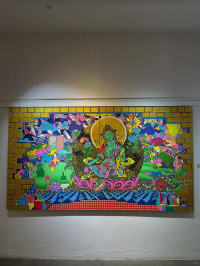Culture & Lifestyle
Yujan Rajbhandari: Investigate the vandalism and reopen files of corrupt officials
Rajbhandari’s journey from a rebellious student to a youth activist reflects a generation demanding accountability, social justice, and democratic reform.
Reeva Khanal
Yujan Rajbhandari spent his early years surrounded by protests, political tension, and the effects of the Maoist insurgency. These experiences shaped his understanding of power, justice, and resistance. He comes from Khotang, near the Solukhumbu border in eastern Nepal, and was raised in an environment rooted in education, awareness, and progressive values, as both of his parents were teachers.
From a young age, he observed how communities handled conflict and authority. He remembers soldiers and Maoist cadres moving through the village, and even insurgents coming to his home and detaining his father because he was a teacher. As a child, he absorbed these tensions and began to ask why such things happened and what justice truly meant.
Rajbhandari began his schooling at Bal Vidya Niketan in Khotang. Curious and slightly rebellious, he asked questions others avoided. While in school, he recalls the new national anthem, the wave of democratic excitement, and joining teachers in rallies—early experiences that deepened his interest in politics beyond textbooks.
Rajbhandari then moved to Kathmandu and stayed in a hostel until the sixth grade. Initially introverted and struggling with the English language, he quickly adapted and showed early leadership by becoming the school captain in grade 9. Through these school elections, he learned the values of fairness and accountability—principles that still guide his activism.
One memory he often recalls is from his Grade 10 year. Like in most Nepali schools, extracurricular activities were halted so students could “focus on studies”. Rajbhandari found this rigid mindset unfair. He and his classmates protested by sitting on the playground with their bags, refusing to enter class—a small act of defiance that, for him, was about students having a voice in decisions made on their behalf.
In high school, Rajbhandari studied science. Even there, he recalls, political discussions were limited and often discouraged. Yet his instinct to question authority remained intact.
When the National Examination Board held in-person Grade 12 exams amid the Covid-19 pandemic, Rajbhandari noticed schools showing only sanitised photos inside exam halls, ignoring the crowded lines outside. He filmed the scene and posted it on Facebook, questioning the discrepancy.
Even after high school, Rajbhandari spoke out when his juniors faced unsafe exam conditions during Covid-19. He visited officials, questioning leaders, and engaging on the ground. Despite preparing for his own exams, he focused on the issue for months, exploring legal options and recognising social media’s power for accountability.
Years later, when he reflects on the Gen Z uprising, he sees a clear connection between these earlier actions and the political awakening of Nepal’s youth. He believes the September protest was not spontaneous—it was the culmination of years of frustration, activism, and a growing digital consciousness among young Nepalis.
Rajbhandari stresses that the social‑media shutdown was only the spark. “The ban was the trigger point,” he says, “but the anger had been building for years.” For young Nepalis, it wasn’t just losing access to Facebook or Instagram, but frustration over paying taxes without fairness or transparency.
Students carried banners reading ‘loot tantra versus lok tantra’, highlighting elite looting versus real democracy—a distilled expression of long‑held grievances. For him, it marked a generation stepping up to demand a voice in shaping Nepal’s future.
To him, the transition from the Covid-era activism to the September uprising is part of a single, continuous thread: a generation refusing to accept silence, demanding accountability, and insisting that politics must now be rooted in institutional reforms, social justice, implementation of the constitution, and strengthening constitutional bodies and political parties. These, he argues, must define Nepali politics going forward.
He also stresses that the protest began peacefully at Maitighar Mandala, with participants singing the national anthem, followed by songs like ‘Gaun Gaun Bata Utha’. According to him, the violent turn of events was not triggered by the youths who led the march. “It is not easy for Singha Durbar to catch fire like that,” he says. “There must be an investigation into who hijacked the protest. Those trying to create conflict or division should be punished.”
In the aftermath of the September protest, Bhandari describes a “period of vacuum” in national leadership. It was during this moment, he says, that the Gen Z protestors supported Sushila Karki—now the prime minister—because of her long-standing reputation for speaking against corruption as Nepal’s first female chief justice.
He recalls that she faced impeachment for challenging powerful political interests, something that resonated deeply with the youth. “She was out there with us, supporting the movement,” he says. “Maybe that gave the youth a sense of direction when the country lacked one.”
Rajbhandari stresses that accountability cannot be selective. Whether it’s the former Prime Minister, the former Home Minister, or local CDOs, he believes every responsible authority should face consequences. He also wants the destruction of public property investigated, insisting the inquiry committee identify those behind the vandalism and reopen files of corrupt officials.
Rajbhandari says he is not planning to run for election anytime soon. Instead, he prefers to support and mentor young people who are entering electoral politics. “I am happy helping youth who are fighting to contest,” he says. “I’m looking forward to the elections—not as a candidate, but as someone standing behind the new generation.”
Examining Nepal’s political history, he notes that every major protest has reshaped the country’s power structure. The September movement, he believes, is another turning point—but not one that merely rejects the past. “The Gen Z movement has discredited the old leaders,” he explains, “but it has not discredited new faces within the old parties. People’s voting patterns are dynamic. We have to trust the citizens.”
Rajbhandari argues that political engagement must go beyond protests and slogans. He believes real change comes from strengthening institutions, enforcing constitutional provisions, and reforming political parties. For him, politics should centre on accountability, transparency, and the proper functioning of democratic bodies—the foundation for lasting social justice.




 20.53°C Kathmandu
20.53°C Kathmandu



.jpg&w=200&height=120)











